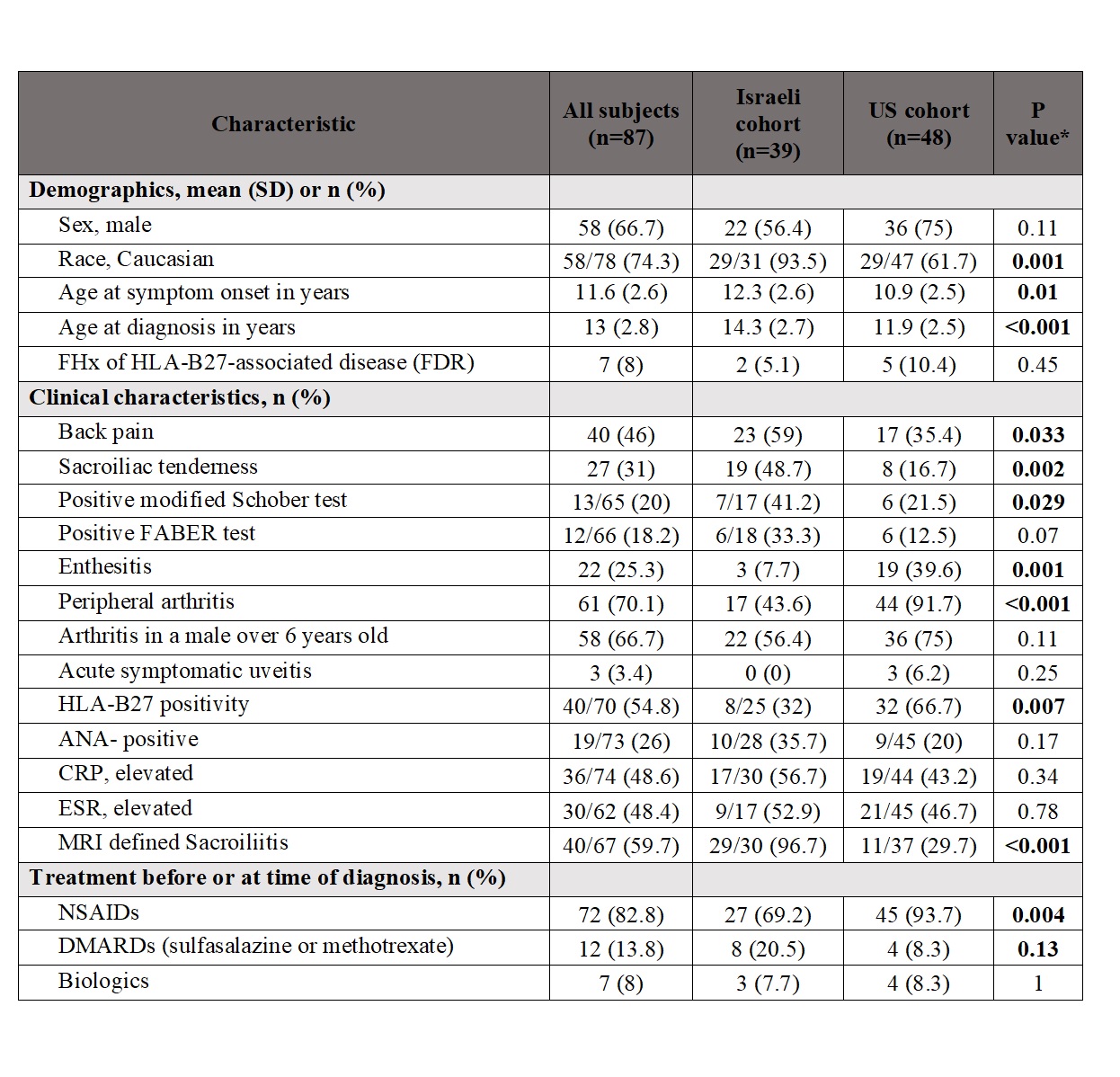Session Information
The 2020 Pediatric Rheumatology Symposium, originally scheduled for April 29 – May 2, was postponed due to COVID-19; therefore, abstracts were not presented as scheduled.
Date: Thursday, April 30, 2020
Title: Poster Session 1
Session Type: ACR Abstract Session
Session Time: 6:00PM-7:00PM
Background/Purpose: Observations among Israeli pediatric rheumatologists reveal pediatric Juvenile Spondyloarthritis (JSpA) may present differently compared to patients from the United States (US). This study aimed to compare the demographic and clinical variables of Israeli and US JSpA patients upon presentation.
Methods: We performed a retrospective, cross-sectional, multicenter comparison of JSpA patients from 3 large Israeli pediatric rheumatology centers (Schneider, Tel-Hashomer, Rambam) and a large US pediatric rheumatology center cohort (University of California San Francisco). The demographic, clinical and imaging features of the subjects upon presentation were compared, including MRI of the sacroiliac joints. Inter Center Comparison (ICC) between the Israeli and US musculoskeletal radiologists was conducted.
Results: Overall 87 patients met the inclusion criteria (39 Israeli, 48 US). As compared to the US population, the Israeli population was less likely to be male (56.4% vs. 75%, p=0.11), and more likely to be older at time of diagnosis (14.3 vs. 11.9 years, p< 0.001). Upon presentation, axial symptoms (inflammatory back pain) and physical examination findings consistent with sacroiliitis (SIJ tenderness, modified Schober test), were significantly more prevalent among Israeli patients (59% vs. 35.4%, 48.7% vs. 16.7%, and 41.2% vs. 21.5%, respectively, all p< 0.05), whereas peripheral arthritis and enthesitis were significantly more prevalent among the US patients (43.6% vs. 91.7% and 7.7% vs. 39.6% in Israeli patients vs. US patients, p< 0.05). In addition, of those who had imaging (N= 30 and N=37 for Israeli and US cohorts) 96.7% of the Israeli patients versus 29.7% of the US patients demonstrated positive MRI findings that were consistent with sacroiliitis (p< 0.001, overall N=67). For HLA-B27, 32% of the Israeli patients vs. 66.7% of the US patients were positive (p=0.007). A high level of agreement ( >90%) was observed between the Israeli and US musculoskeletal radiologists.
Conclusion: Israeli children with JSpA presented almost exclusively with axial disease compared to US patients who were more likely to present with peripheral symptoms. Moreover, HLA B27 prevalence was significantly lower in the Israeli cohort compared to the US cohort. Further studies are needed to unravel the genetic and environmental factors associated with these findings. Further studies are needed to unravel the genetic and environmental factors associated with these findings.
To cite this abstract in AMA style:
Ghantous N, Heshin Bekenstein M, DeQuattro K, Lakovsky Y, hendel a, Rappoport N, Butbul Aviel Y, Tirosh I, Harel L, Weiss P, Gensler L, Amarilyo G. Differences in Clinical Presentation Between Israeli and United States Children with Juvenile Spondyloarthritis [abstract]. Arthritis Rheumatol. 2020; 72 (suppl 4). https://acrabstracts.org/abstract/differences-in-clinical-presentation-between-israeli-and-united-states-children-with-juvenile-spondyloarthritis/. Accessed .« Back to 2020 Pediatric Rheumatology Symposium
ACR Meeting Abstracts - https://acrabstracts.org/abstract/differences-in-clinical-presentation-between-israeli-and-united-states-children-with-juvenile-spondyloarthritis/


